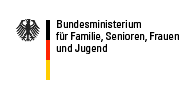Aspects
Economy - gender aspects
- Representation: women are less frequently represented in middle and higher management positions than men, both in companies and in industrial and economic associations. Gender Mainstreaming helps in the conception of sensibilization measures for perceiving women as potential managers. In this area, Gender Mainstreaming is effective as a double strategy, as targeted promotion programmes continue to be necessary in this area in particular in order to raise the share of women.
- Care economy: economic theories and statistics are largely gender blind. The extended sector of unpaid work in the household, predominantly done by women, is not included in economic calculations, although it too adds value. Which data have to be gathered in order to be able to include unpaid economic activity in the calculation of the gross domestic product?
- Extension of loans: banks extend loans less frequently to women than to men who want to become self-employed. How can on the one hand women be trained to meet the specific loan application criteria and on the other hand these criteria be geared more strongly to the entrepreneurial needs of women?
- Business starts: Business starts come from different motivations in men and women and take place at a different time. Women tend to start businesses when they are aged 35-45 when the family phase has closed, in order to be independent of the man. Within the framework of Gender Mainstreaming, too, specific consultancy should be offered to support women as entrepreneurs or in starting their businesses.
- Staff:Gender Mainstreaming requires concrete targets for the removal of vertical and contractual segregation in private and public sector businesses and companies. Which gender specific data are missing in businesses for the quantitative and qualitative development of targets and how can this process be improved or initiated by means of new staff development tools?
- Business planning: In the planning of new works attention is predominantly paid to male requirements such as sufficient parking spaces, while more female needs, such as in-house childcare facilities, are ignored. Award criteria in accordance with gender aspects for economic subsidies can integrate workplace factors for all staff.
Further reading and links
Federal Ministry for Family Affairs, Senior Citizens, Women and Youth (BMFSFJ): 2nd Assessment of Equal Opportunities Women in Managerial Positions - Second Assessment of the Agreement between the Federal Government and the Central Associations of German Business on Promoting Equal Opportunities for Women and Men in the Private Sector (2006).
Federal Ministry for Family Affairs, Senior Citizens, Women and Youth (BMFSFJ): Policy for Equal Opportunities: Women in SMEs (2007).
BMFSFJ: Politik für Chancengleichheit: Frauen im Mittelstand, Oktober 2004
www.gruenderinnenagentur.de
BMFSFJ: 12 Diskussionspunkte zur Förderung einer gleichberechtigten Teilhabe von Männern und Frauen bei Unternehmensnachfolge und Existenzgründung. Berlin 2002.
BMFSFJ / Zentralverband des deutschen Handwerks (Hrsg.): Familienfreundliche Maßnahmen im Handwerk - Potenziale, Kosten-Nutzen-Relationen, Best Practices, Berlin 2004.
BMFSFJ: Existenzgründungsprozesse im Zu- und Nebenerwerb von Frauen und Männern, Empirische Analyse der Bedingungen und Verläufe bei Gründungs- und Entwicklungsprozessen von Unternehmen unter besonderer Berücksichtigung Genderspezifischer Aspekte, 2001
BMFSFJ u.a.: Bilanz 2003 der Vereinbarung zwischen der Bundesregierung und den Spitzenverbänden der deutschen Wirtschaft zur Förderung der Chancengleichheit von Frauen und Männern in der Privatwirtschaft, Berlin 2003
BMFSFJ: Lokale Büdnisse für Familie, Informationen zur Initiative, Berlin 2004
DGB: Chancengleichheit von Frauen und Männern in der Privatwirtschaft, Eine Befragung des Managements von 500 Unternehmen zur Umsetzung der Vereinbarung zur Förderung der Chancengleichheit, 2004
BMFSFJ: Betriebswirtschaftliche Effekte familienfreundlicher Maßnahmen - Kosten-Nutzen-Analyse, Berlin 2003.
Prognos AG / BMFSFJ: Work-Life-Balance - Motor für wirtschaftliches Wachstum und gesellschaftliche Stabilität, Analyse der volkswirtschaftlichen Effekte – Zusammenfassung der Ergebnisse, Berlin 2005.
BMFSFJ / Zentralverband des Deutschen Handwerks: Familienfreundliche Maßnahmen im Handwerk - Potenziale, Kosten-Nutzen-Relationen, Best Practices, Berlin 2004.
BMFSFJ / DIHK / Beruf & Familie gGmbH: Familienorientierte Personalpolitik - Checkheft für kleine und mittlere Unternehmen, Berlin 2004.
Federal Ministry for Family Affairs, Senior Citizens, Women and Youth (BMFSFJ): Policy for Equal Opportunities: Women in SMEs (2007).
BMFSFJ: Politik für Chancengleichheit: Frauen im Mittelstand, Oktober 2004
www.gruenderinnenagentur.de
BMFSFJ: 12 Diskussionspunkte zur Förderung einer gleichberechtigten Teilhabe von Männern und Frauen bei Unternehmensnachfolge und Existenzgründung. Berlin 2002.
BMFSFJ / Zentralverband des deutschen Handwerks (Hrsg.): Familienfreundliche Maßnahmen im Handwerk - Potenziale, Kosten-Nutzen-Relationen, Best Practices, Berlin 2004.
BMFSFJ: Existenzgründungsprozesse im Zu- und Nebenerwerb von Frauen und Männern, Empirische Analyse der Bedingungen und Verläufe bei Gründungs- und Entwicklungsprozessen von Unternehmen unter besonderer Berücksichtigung Genderspezifischer Aspekte, 2001
BMFSFJ u.a.: Bilanz 2003 der Vereinbarung zwischen der Bundesregierung und den Spitzenverbänden der deutschen Wirtschaft zur Förderung der Chancengleichheit von Frauen und Männern in der Privatwirtschaft, Berlin 2003
BMFSFJ: Lokale Büdnisse für Familie, Informationen zur Initiative, Berlin 2004
DGB: Chancengleichheit von Frauen und Männern in der Privatwirtschaft, Eine Befragung des Managements von 500 Unternehmen zur Umsetzung der Vereinbarung zur Förderung der Chancengleichheit, 2004
BMFSFJ: Betriebswirtschaftliche Effekte familienfreundlicher Maßnahmen - Kosten-Nutzen-Analyse, Berlin 2003.
Prognos AG / BMFSFJ: Work-Life-Balance - Motor für wirtschaftliches Wachstum und gesellschaftliche Stabilität, Analyse der volkswirtschaftlichen Effekte – Zusammenfassung der Ergebnisse, Berlin 2005.
BMFSFJ / Zentralverband des Deutschen Handwerks: Familienfreundliche Maßnahmen im Handwerk - Potenziale, Kosten-Nutzen-Relationen, Best Practices, Berlin 2004.
BMFSFJ / DIHK / Beruf & Familie gGmbH: Familienorientierte Personalpolitik - Checkheft für kleine und mittlere Unternehmen, Berlin 2004.
erstellt von Administrator
—
zuletzt verändert:
02.01.2010 20:08






